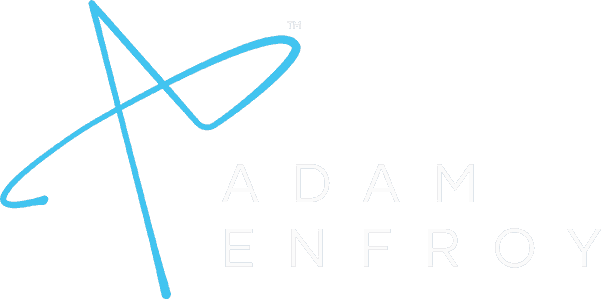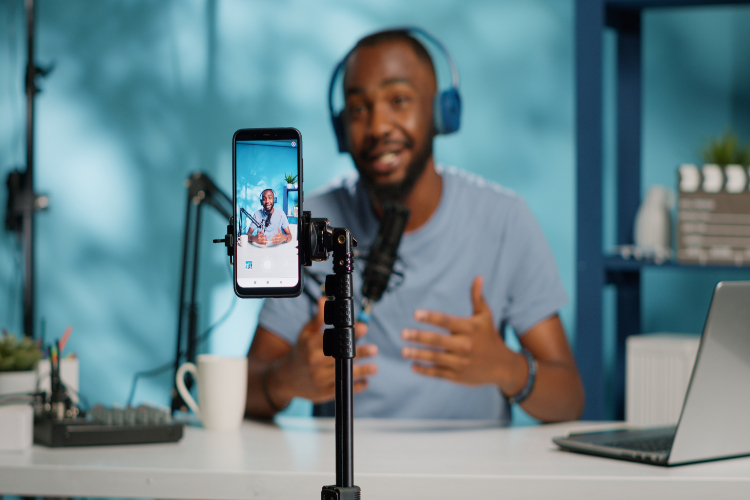How To Do Keyword Research Using ChatGPT (Guide for 2024)
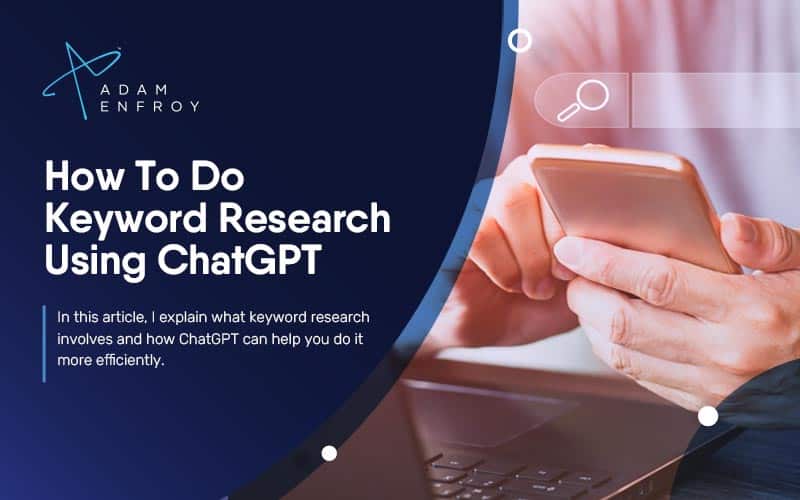
Have you ever wondered why some websites are more successful than others in SEO?
While many factors go into having a successful website, keyword research is one of the most important.
Traditionally, keyword research was a long and tedious process that required manual labor.
But with ChatGPT, the process can become much simpler and more efficient.
In this article, I’ll explain what keyword research is all about and how ChatGPT can help you do it efficiently.
If you want more people visiting your website, looking at your offers, and buying your products, read on to learn more about this crucial process.
- What is Keyword Research?
- What Is ChatGPT?
- Benefits of Using ChatGPT for Keyword Research
- How To Do Keyword Research Using ChatGPT
- The Potential Risks of ChatGPT
- ChatGPT For Competitor Analysis & Backlink Building
- ChatGPT & Google Keyword Planner
- Other ChatGPT Considerations
- How To Do Keyword Research Using ChatGPT – FAQ
- Wrap Up.
What is Keyword Research?
Keyword research analyzes search engine data to uncover the terms and phrases people use when looking for answers online.
This process is essential to any successful keyword strategy and is integral to producing high-quality content people want to consume.
Additionally, keyword research helps identify potential topics, competitors’ strategies, and target audience interests.
Keyword research can also provide valuable insights into what potential customers are searching for and make your website more attractive to search engines.
Thankfully, keyword research tools like ChatGPT make the process much easier and faster.
Using ChatGPT, one can do keyword research from seed keyword phrases and quickly generate thousands of potential search terms related to the topic.
Another goal of keyword research is to help you create compelling meta descriptions.
A compelling meta description optimized for relevant keywords will appear on the search engine results page when someone searches for those terms.
Using ChatGPT, one can easily input the required information and have the artifical intelligence produce a snippet of text ready to publish.
With ChatGPT, keyword research can become automated (more on this later).
What Is ChatGPT?
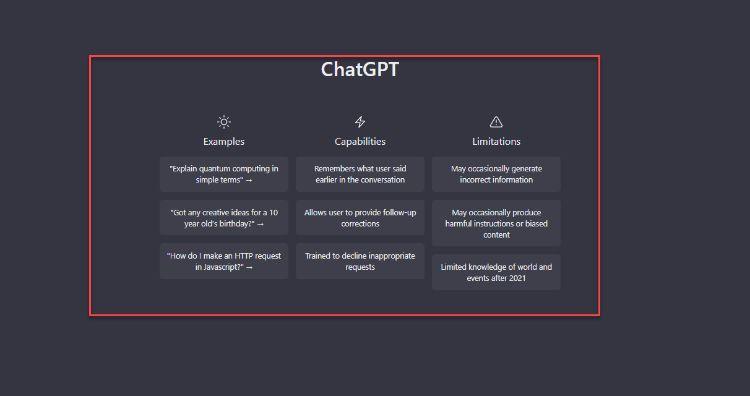
Created by OpenAI, ChatGPT is a natural language processing tool that people can use as an assistant when conducting keyword research.
If you provide the correct input, it can also consider what your customers are looking for and how they’re asking for it.
This feature is something traditional search engine optimization (SEO) algorithms don’t always accomplish.
Using machine learning software, ChatGPT can quickly provide comprehensive reports with accurate information that makes understanding user intent easier.
Such information leads to better results related to your target market sector.
ChatGPT could be an invaluable tool for beginners and experts alike regarding high-level keyword research.
ChatGPT is also easier to use and understand than other keyword research tools.
You must plug in your desired phrases, issue a command, and let the tool work its magic.
For example, say you’re a clothing retailer targeting “fashion clothing.”
After plugging this into ChatGPT, it will provide you with plenty of keyword ideas such as “women’s fashion clothing,” “trendy clothes,” or “stylish outfits.”
Then, with this data, you can use keyword rank tracking software to get accurate search volume metrics.
Such data lets you know how popular specific keywords are among people searching on Google.
By leveraging the power of ChatGPT, marketers and website owners alike can quickly identify profitable angles within their niche or industry and confidently launch campaigns.
Benefits of Using ChatGPT for Keyword Research
Using ChatGPT for keyword research has several advantages compared to traditional methods.
With ChatGPT, users can quickly narrow down large lists of potential keywords into a more manageable list.
By filtering them according to competitiveness levels, they spend less time researching and more time optimizing.
Additionally, since the tool can uncover search intent (which is key regarding SEO for bloggers), users can have more insight into which keywords are likely to be most profitable for their campaigns.
How To Do Keyword Research Using ChatGPT
Here are the steps to follow when using ChatGPT in keyword research.
Keyword Discovery
Discovering keywords can start in various ways.
The first step is brainstorming based on your niche or industry and thinking of possible related topics, products, services, and customers.
Once you have some ideas, plug them into ChatGPT and ask, “What additional keywords can I target from these seed keywords?”
Then input a few seed keyword ideas.
ChatGPT will then generate keywords related to the topics you entered.
If you’re in a competitive industry, you should focus on low-competition keywords.
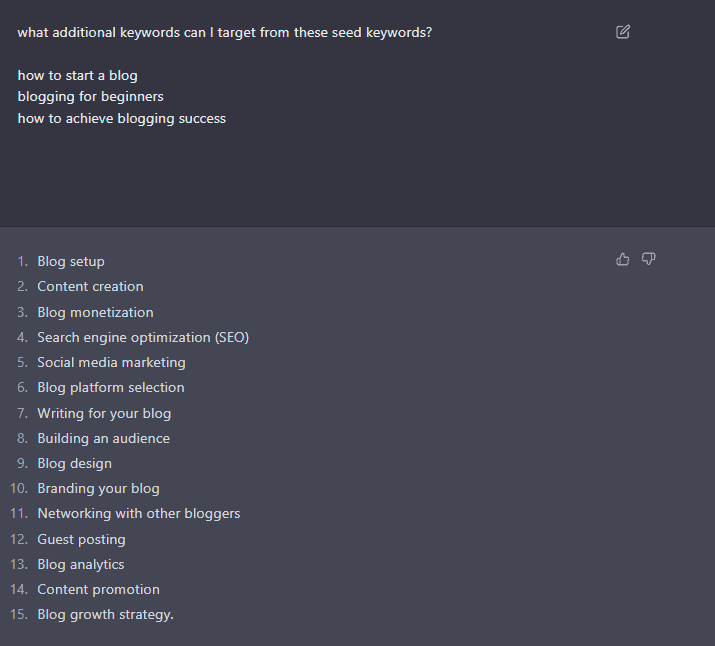
These keywords are generally easier to rank for than more specific ones.
Tools such as Ahrefs or Semrush allow you to check which keywords are easier to rank for through their keyword difficulty score.
You can also ask ChatGPT to give you additional keywords for each category.
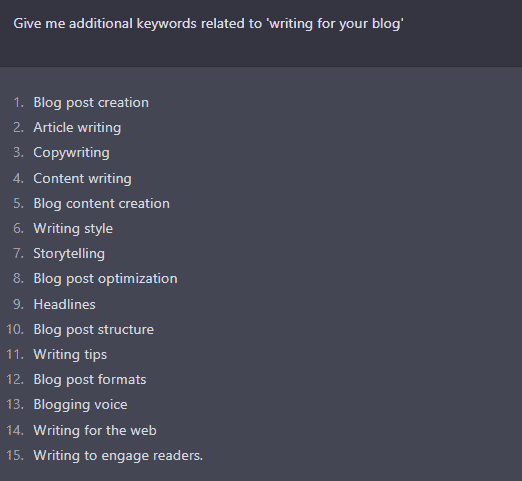
Long-Tail Keywords Research
Once you’ve identified some potential keywords, it’s time to dive into long-tail keyword research.
Long-tail keywords are longer phrases (usually three or more words) that are more specific and less competitive than shorter ones.
They tend to be much more valuable because they have higher conversion rates and lower competition levels, making them easier to rank in search engine results pages (SERPs).
The longer and more detailed the search query is, the higher its chances of ranking in search engine results pages (SERPs).
You can ask ChatGPT to refer to the previous seed keyword or the list of generated keywords and provide you with longer-version of them that are more specific.
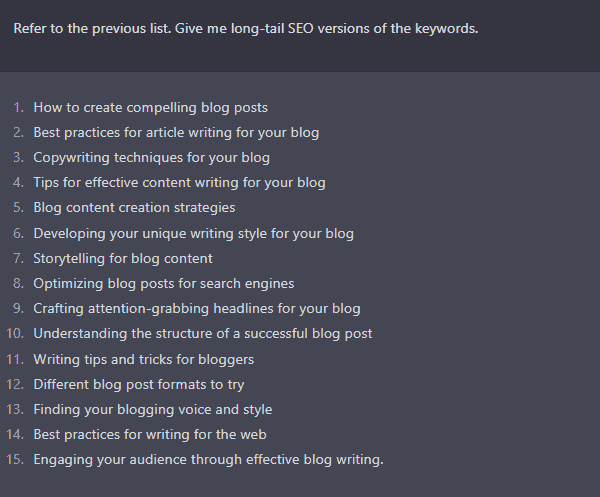
You could even ask ChatGPT to remove additional keywords that have no SEO value.
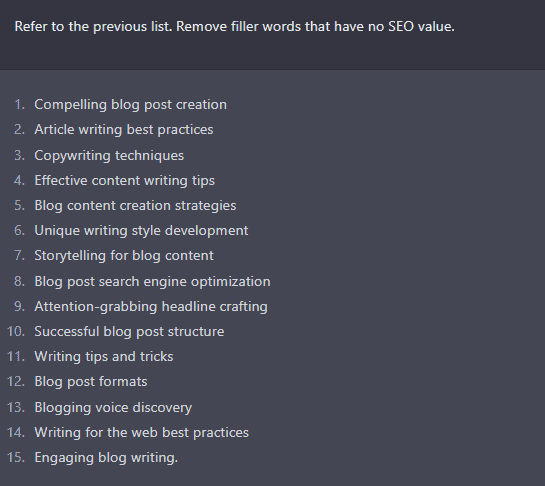
Alternatively, you could start from scratch and compare the two generated lists.
Either way, the ChatGPT engine will use natural language processing techniques to give you a list of relevant LSI keywords, related topics, and long-tail keywords.
Keyword Clustering
The last step in keyword research with ChatGPT is clustering those keywords into groups.
It’s a good idea to base this process on the keywords’ relevance to each other.
Grouping similar terms together will help refine content plans by ensuring you address all related topics in detail.
It can also boost SEO performance and help ensure quality content creation.
ChatGPT makes it easy to cluster keywords together, making this process fast and efficient.
For this example, I’ve gone one level above and asked ChatGPT to:
Give me different categories I can target with my blog about ‘starting a blog’
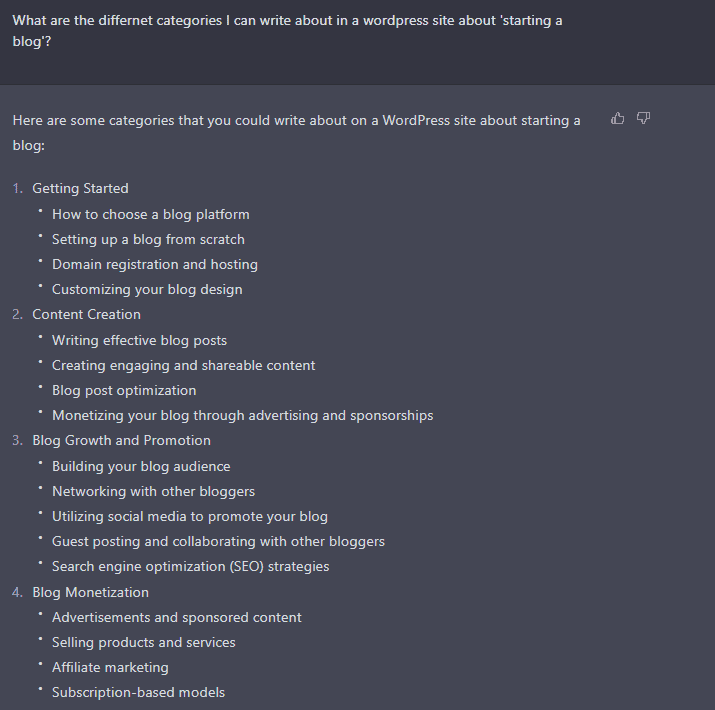
Output various keywords for each category.
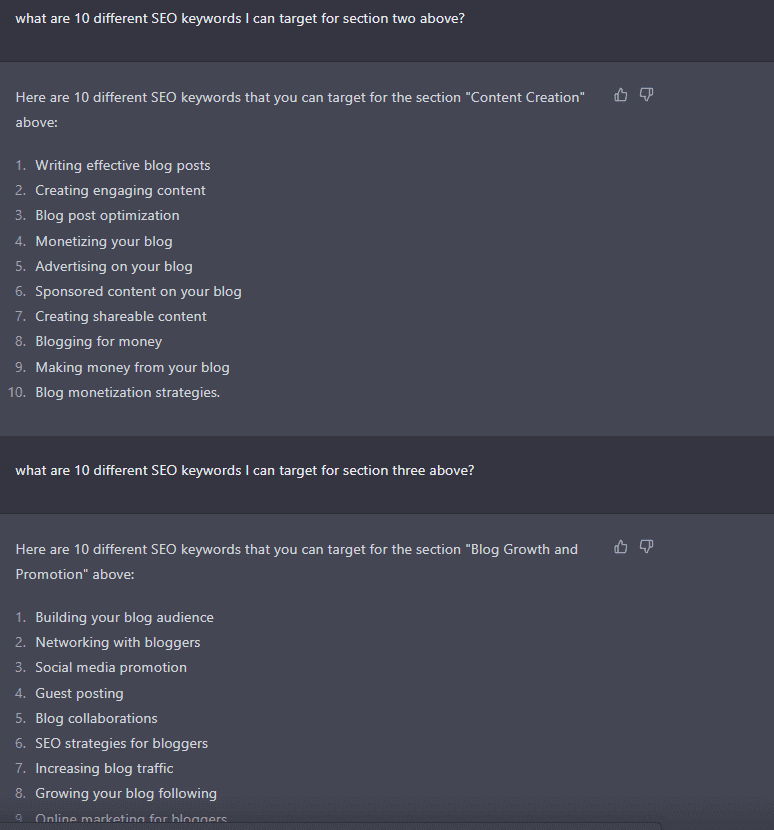
Mix up all the keywords.
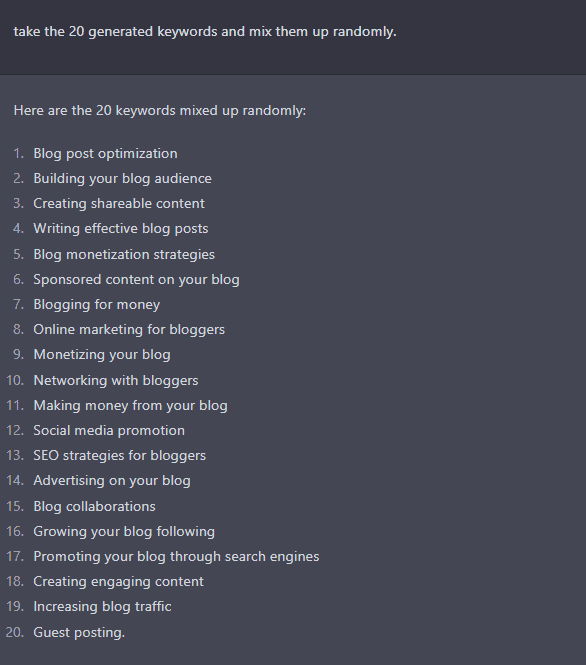
Cluster them into three distinct categories – using different categories than the ones generated in the first place.
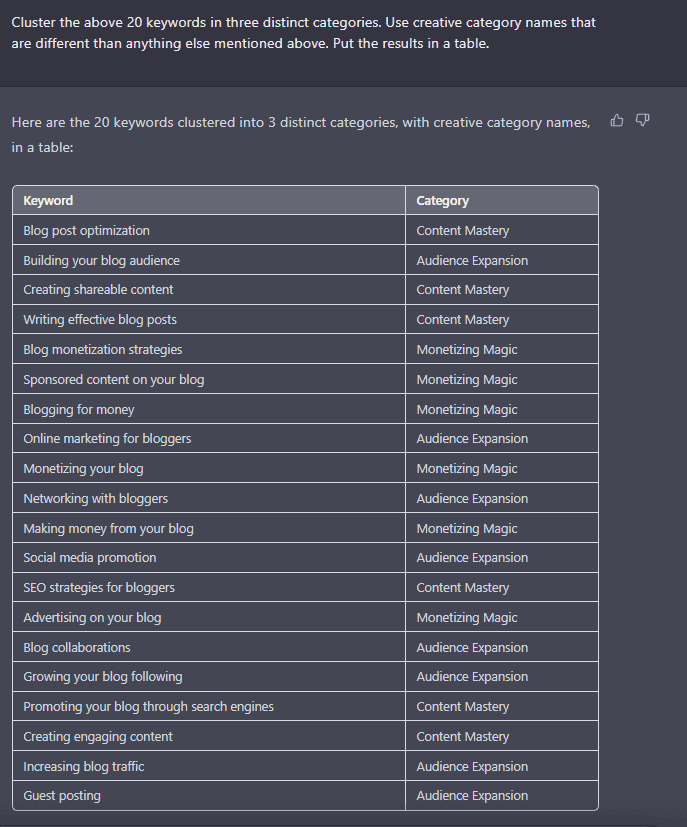
The Potential Risks of ChatGPT
While the above sounds great in automating your keyword research, one must also consider the potential risks of using ChatGPT in this area.
Firstly, bias in its training dataset can hinder the AI’s accuracy.
If the training dataset contained any prejudice or misinformation, the outputs generated by ChatGPT would reflect this.
Additionally, due to the rapid pace at which information changes online, knowledge stored in the AI may become outdated quickly.
This fact results in the tools generating inaccurate or irrelevant outputs when attempting to complete keyword research tasks.
As ChatGPT is a chatbot, it is also essential to recognize that it can’t match the same level of sophistication and nuance in conversation as a human.
If misused, this could increase the likelihood of negative customer experiences due to the AI’s lack of understanding of complex queries.
Without understanding the FAQs associated with using this technology, it can be easy to fall into the trap of relying on inaccurate information or outdated knowledge.
Always fact-check the results generated by ChatGPT before using them to optimize your website.
By doing this, you can ensure that the keyword research done with ChatGPT is accurate and up-to-date.
ChatGPT For Competitor Analysis & Backlink Building
Competitor analysis is essential for any business wanting to stay ahead of the curve.
It allows you to track your competitors’ actions and ensure that your strategies remain up-to-date.
With the rise of analytics platforms, this process has become easier than ever.
Now, with ChatGPT, you can understand your competitors’ keyword strategies on a new level.
ChatGPT can analyze competitors’ content in real-time.
Simply paste a chunk of text and ask ChatGPT to identify the keywords used in the article or summerize the article’s content.
You can see new trends and adjust your marketing strategy accordingly.
When analyzing competitors’ content, ChatGPT can identify topics your competitors are currently discussing and provide suggestions for differentiating yourself.
This information can help you stand out from the competition and give your content an advantage.
When it comes to building backlinks, ChatGPT can also be used to identify influencers who may be willing to link back to your content.
Here are a few key ways you can use ChatGPT to help you in your backlink building-strategies:
- ChatGPT to find relevant websites, influencers, keywords, online communities, and events related to your industry.
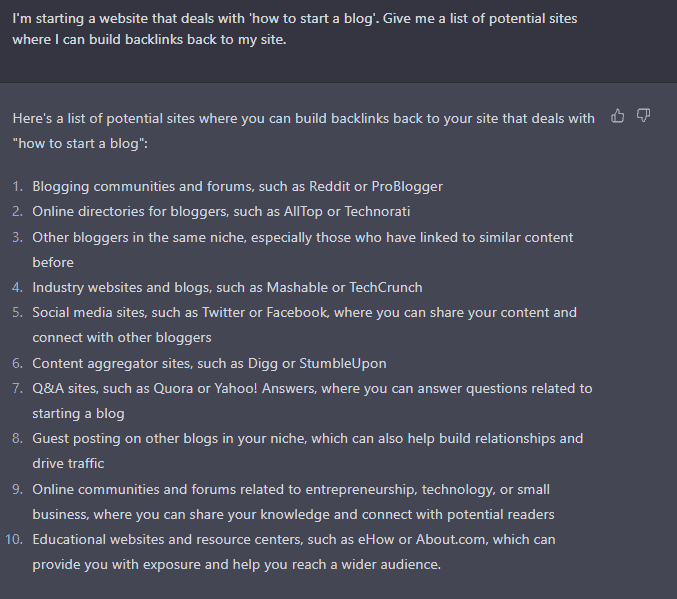
- Use it to generate creative ideas for keywords and content.
- Leverage its capabilities in writing outreach emails quickly.
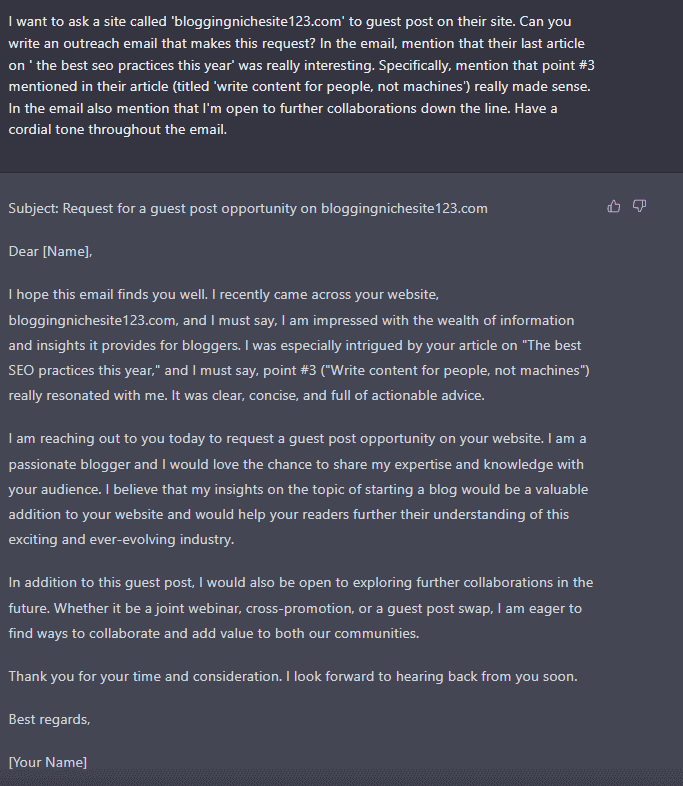
- Take advantage of its ability to identify competitor web pages.
- It can also help identify sites one can monitor for broken link opportunities as part of competitor analysis.
Note that you still have to do the work and follow the proper link-building practices.
So far, you can only use ChatGPT to supplement your efforts and make the task much more manageable.
ChatGPT & Google Keyword Planner
If you want to know precisely how many people are searching for specific words and phrases, the Google Keyword Planner is a free keyword research tool to consider using alongside ChatGPT.
The Google Keyword Planner is a free tool provided by Google Ads.
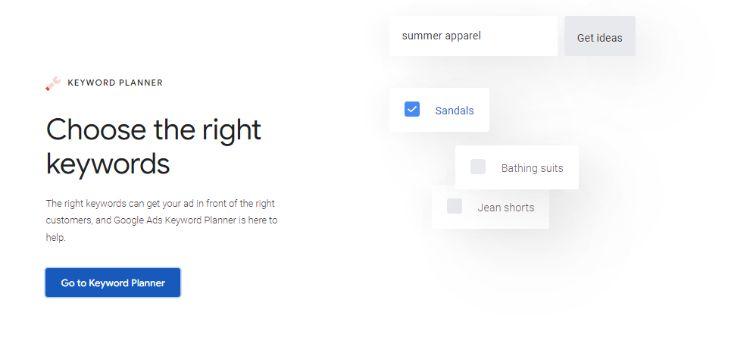
It helps businesses discover keywords related to their product or service and estimate search volume.
Such data gives savvy marketers invaluable insights into their target audience’s behavior.
Understanding your audience’s process when searching online is critical to successful keyword research.
This understanding can also help you create content that resonates with them.
To use the Keyword Planner effectively, you will need to set up an Ads account if you don’t already have one.
You will have two options: find new keywords or get search volume and forecasts.
Select whichever option best fits your needs and enter any relevant information, such as your website URL or target location.
Look through your keyword ideas list to determine the most relevant to you and your business goals.
Pay particular attention to average monthly searches, competition level, CPC, and any additional metrics that may be useful in determining search trends over time.
Additionally, you can use this data to optimize existing campaigns further or develop new ones tailored to specific keywords or topics.
Other ChatGPT Considerations
Here’s some more information on ChatGPT to know.
The Benefits of ChatGPT Automation
Automation using ChatGPT can take many forms, shapes, and sizes.
Automating keyword research is excellent, but there are other ways to benefit from ChatGPT.
ChatGPT users can use its automation to:
- Write LinkedIn posts
- Craft effective social media marketing campaigns
- Create PPC marketing campaigns for various advertising platforms
- Optimize existing WordPress websites to make money through blogging
- Start a YouTube channel and identify trending topics within a particular niche or industry
- And more.
The Impact on Businesses
Companies can use this tool’s natural language processing capabilities to identify relevant search terms and match them with their marketing campaigns.
Using a GPT3 chatbot to research keywords can hugely impact businesses and social media marketers.
Companies can create more effective targeted campaigns and optimize their content for increased organic visibility.
However, businesses will still need knowledgeable professionals who understand how best to use this technology to maximize its potential impact.
Additionally, businesses should consider combining no-code automation platforms and ChatGPT-generated code to improve existing processes or systems within their organization.
How To Do Keyword Research Using ChatGPT – FAQ
Is ChatGPT A Valuable Tool For Keyword Research?
Yes, ChatGPT is a valuable tool for keyword research.
The NLP technology behind this tool enables it to interpret an entire blog post, various conversations, and content as humans would understand them.
This ability allows it to determine nuances in a query that traditional methods can’t pick up on.
How Do You Cluster A List Of Keywords To Ensure They Make Sense Together?
To cluster a list of keywords, you must group similar topics.
For example, if you’re looking for keywords related to “restaurants near me,” then you might group keywords such as “best restaurants near me” and “top-rated restaurants near me.”
You can also use ChatGPT’s natural language processing to identify secondary keywords or phrases quickly.
By grouping similar topics together, you can ensure that your list of keywords makes sense and is appropriately targeted.
What’s The Essential Step-By-Step Guide To Finding The Right Target Keywords And Phrases Using ChatGPT?
Here are the steps to follow:
- Define your topic and goals: Knowing what you want to discover before starting your keyword research is essential.
- Generate a list of keywords: Brainstorm a list of relevant words and phrases that relate to your topic.
- Run keyword variations through ChatGPT: Use this tool to find phrases related to your keywords and broaden your list.
- Group related keywords together: Organize the keywords into meaningful clusters.
- Analyze the data: Use tools like Google Trends or Moz Keyword Explorer to discover which topics are trending in your industry. Here’s a complete list of SEO tools you can consider.
- Optimize existing content pieces: Once you’ve identified the right keywords, you can begin optimizing existing content pieces and creating new ones that will better serve your audience’s needs.
How Do AI Tools Use Generated Content To Improve Organic Visibility?
AI tools such as ChatGPT can generate content that is more in line with the phraseology used by your target audience.
This content can improve organic visibility by driving more targeted traffic to your website through a higher ranking in the search engine results pages.
Are Free Keyword Research Tools Available?
Yes, there are several free tools available.
However, paid tools generally provide more comprehensive insights into user intent and query nuances that free tools may not offer.
Wrap Up.
Using ChatGPT for keyword research can be a powerful way to inform your digital marketing strategy.
It gives you an edge over the competition by providing insights into what topics people want to know more about and helps optimize content for higher search engine visibility.
Whether you’re a blogger, content creator, or digital marketer – leveraging ChatGPT’s keyword analysis capabilities can help create content that resonates with your target audience.
By implementing the above strategies using the right tools, you can ensure your content is well-optimized for visibility and maximize the chances of reaching the people that can move your business forward.
Further reading on AdamEnfroy.com: Want to learn more about ChatGPT?
Here are the various uses of ChatGPT in digital marketing.
Moreover, here are the ways to make money with ChatGPT.
Finally, consider alternatives to ChatGPT if you’re looking for more options.
